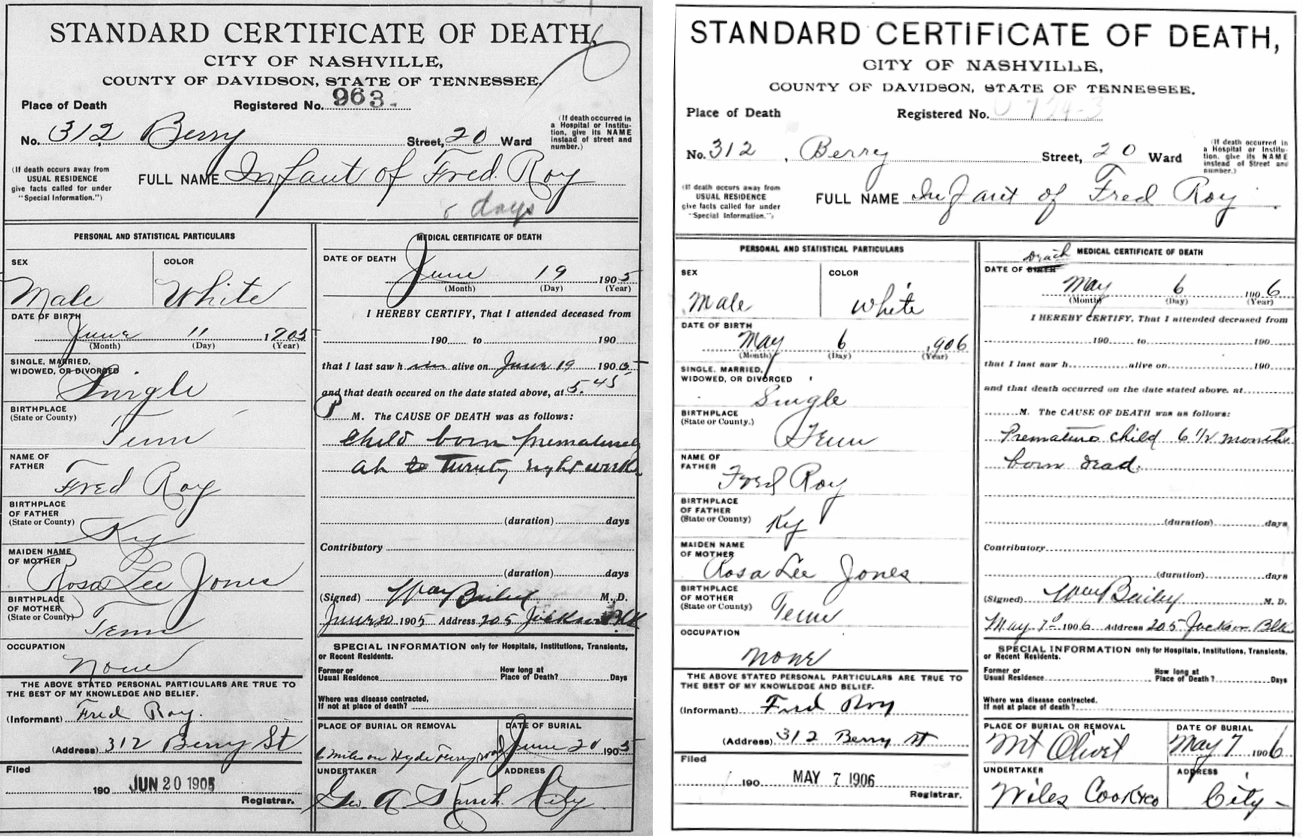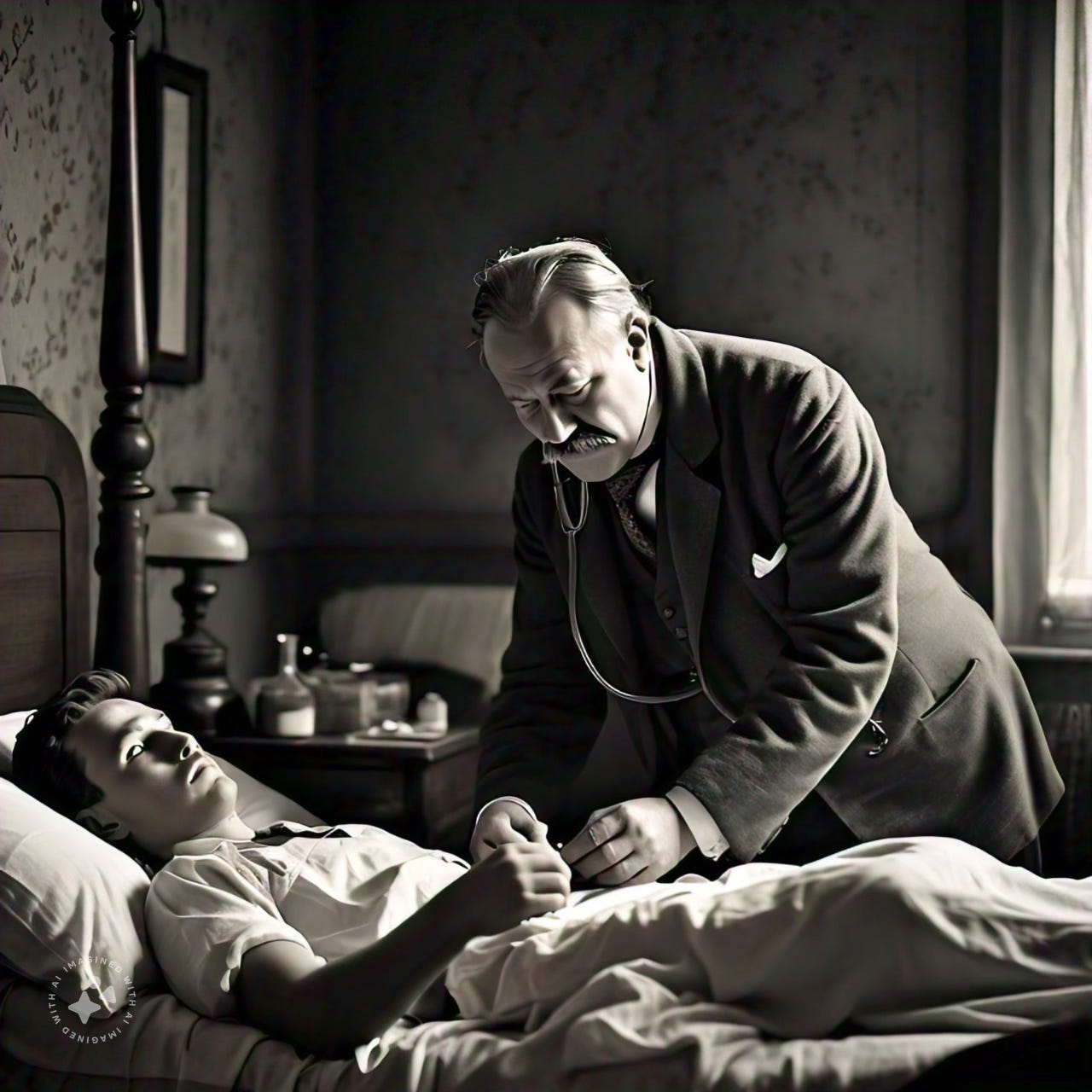Part 1 of this story ended nine days after the hasty marriage of Gordon Roy and Mildred Ellis. When the couple was interviewed in their one-room E. Franklin Street apartment, Gordon was still lovestruck but Mildred’s adoration was beginning to show more than a few cracks.
Before starting in with what happened next, allow me to give a bit of backstory for Gordon since his family doesn’t live in the area where this occurred. Gordon’s father was Frederick Roy, born in 1874 in Jordan’s Station, Kentucky, a community that was in the south-western portion of the state but is no longer there. Gordon’s mother was Rosa Lee Jones, born in Tennessee around 1882. Fred and Rosa’s wedding was described in the November 16, 1894 edition of the Nashville Banner, where Rosa’s father, Benjamin Jones, was a printer. The wedding took place at the home of Fred’s brother Edward on VanBuren Street in Nashville. Fred was working for the dry goods company of O’Bryan Brothers and was said to possess “excellent business qualifications.”
In June of 1908, Gordon’s mother reported to police that her 12-year-old son had disappeared while walking to work. That’s right, not walking to school, but to work. He was working as a “bundle boy” at Castner-Knott department store. The store stated Gordon was “giving entire satisfaction” in his work. His mother told police Gordon had been acting strangely lately and she feared his mind may be affected. She said he was wearing a blue coat and cap with brown trousers when he left home. There was no report of when Gordon returned home, which he clearly did at some point, or where he had been, but it is an interesting insight into previous issues Gordon may have had in dealing with the loss of his father and the stress of being a child who was working rather than going to school.
Rosa and Fred had six children, two of whom did not survive, one being stillborn and the other living only eight days. On November 13, 1906, Fred died of pneumonia at the home of a friend on Berry Street in Nashville. Why he was being cared for at the home of James Campbell may have been because he had small children and a pregnant wife at home. Rosa and Fred’s last child, Christine Kathryn, was born in 1907 after her father had died, leaving Rosa a widow with four children. In 1910, Gordon was still living with his mother and three siblings in Nashville. I don’t know exactly when Gordon left Nashville for Evansville, but he was there in 1913.
I’ve wondered how Mildred and Gordon met. In April of 1913, Gordon’s uncle Andrew J. Roy, his father’s youngest brother, was his guardian. Andrew was a cutter at David S. Bernstein’s company in Evansville which made overalls. Tailoring was a family businesses and Andrew had experience at this. Gordon lived with Andrew and his family on the lower floor of a house at 1013 E. Michigan (the house is now gone). An article says that one day in April, Mildred knocked on their door looking for the family that lived on the second floor. She said she’d come from Grayville, Illinois to visit them. This surely must be the day the pair met.
I do want to correct one thing based on information I found since writing part one of this story. The Charles Ellis who was working in Evansville in 1913 was a different man. There are so many inconsistencies in the documents that exist; it can be difficult to sort through them. It’s made more obscure since the Ellis family moved around a lot: Grayville, Princeton, Evansville, back to Grayville, etc. Also, since Grayville was a small community, there are far fewer records for the years between census years and there are no local newspapers available in the archives I have a membership to from any city closer than Mt. Carmel for the pertinent years.
Back to 1913.
At some point rather soon after the newspaper interview with Gordon and Mildred Roy, Gordon took her back to her family home in Grayville. This was a temporary stay. The pair were turned out of their current digs at a boarding house at 30 Carpenter Street, run by Mrs. Lydia Foster because of the arguments they had that were disturbing the other residents. Gordon couldn’t find an available room at a price they could afford, so the decision was made for Mildred to return home until Gordon could secure a place for them.
During their separation, letters were sent back and forth between the newlyweds until finally, on Monday, August 11th, Gordon fetched Mildred and took her back to Evansville where they took lodgings with a Mrs. Schneider at 612 Division Street. (For readers in Evansville, this portion of what was Division Street is now Court Street.) However, Mildred was dissatisfied with the room, saying it was “shabby,” but Gordon promised to fix the room up for her.
On Tuesday night, August 12, they went to the Orpheum Theater. On the morning of Wednesday, the 13th, the landlady asked for the rent. Gordon stalled for time saying he had to wait until he was paid. He left for his job, telling Mildred he would be back around 11:00 a.m. Instead, he returned by 9:30 and said he was ill. He and Mildred argued, again.
Mildred went to the boarding house parlor to play piano and visit with the landlady’s young daughter, Emma. When she returned to their room thirty minutes later, Mildred noticed an empty glass with the remains of some milky liquid in the bottom and powdery grains around the rim.
I would expect her to ask Gordon if something was wrong or if he had taken something and perhaps she did because Gordon complained that his stomach was cramping and his throat was on fire. A fuller account of this interaction comes out later, but at this point, Mildred got a pitcher of water for Gordon who, “…drank a lot of water then went into the bathroom. He was really weak.”
Mildred asked if he needed a doctor but he said no. Because he denied a doctor, Mildred thought he was fooling with her, saying he’d feigned this kind of thing before to get her to not be angry with him when they were fighting.
Gordon didn’t go downstairs for lunch that day and said maybe he did need a doctor after all because the pain was getting worse. Mildred asked Mrs. Schneider to call a doctor, which she did, but the physician said he couldn’t be there until that evening. After lunch, Mildred told Gordon she was going out and would be back later that night. According to the landlady, this wasn’t unusual, and in fact, she said Mrs. Roy did this every day.
Mildred’s explanation was that she went out, talked to some friends, went to the cotton mill and watched the machines for a while, then ate supper with her sister before returning to the room.
Before Mildred returned home that evening, Dr. Daniel B. Cain arrived to examine Gordon. His findings were that Gordon had a racing pulse of 140 beats per minute, intense stomach pain and burning, but no fever. He administered an injection to help him sleep.
When Mildred returned, she said she tried to sleep but Gordon kept thrashing and groaning about his stomach and kept bumping into her. She took her pillow and a blanket and tried to sleep on a rug on the floor. When another boarder knocked on the door at 4:00 a.m. and shouted to keep it down, Mildred got dressed and left the boarding house.
At 6:00 a.m., the landlady went to check on him because the groaning became “hideous, low, long, and gurgling, like that of mortals passing away.” Gordon lay on the bed, clearly in pain, but was unable to speak. Mrs. Schneider again called for help and Dr. Cain returned, but Gordon was dead by the time he arrived. The doctor calculated he’d been dead for 1-2 hours.
Notice was taken that Mildred had not been there at 6:00 a.m. when Mrs. Schneider went to the Roy’s room. It was also noted that she did not return until the next day even though she was publicly being sought. Mrs. Schneider said that even when she did return, it was to ask if she could collect her suitcase.
My first inclination is to wonder why she was asking if she could get her suitcase from her own room. Presuming she had been gone since 4:00 a.m. Having no communica-tion with anyone at the boarding house since then, she would have done what anyone would have done and simply gone directly to her room. Unless there was a hubbub going on and access to her room was denied, why was she asking?
When Mildred asked the landlady, who was clearly fed up with the situation, snapped back, “Your suitcase is at the morgue with your husband’s body!” She said Mildred appeared stunned, then turned and ran.
Police were called and were “unable to locate” Mildred, although they didn’t look very hard, or at all, based on their own public statement several days later. The newspaper printed that a search for “the chubby girl in short dresses” was being carried out. And it was the press who found her at her sister Nellie’s house, the sister who had accompanied Mildred on the quest for a marriage license.
The press were brought into the house to speak with Mildred who was reluctant to say anything and spent a lot of time pacing the parlor floor. Nellie urged her to “tell it all.” So, Mildred did tell her version, which was slightly different than the previous account; not significantly, but just different enough that the police were called again. They declined to become involved.
It was the Coroner who searched the couple’s room. He actually gathered up all the couple’s belongings and took them to his office at the Courthouse. Among those items, he found the letters sent from Mildred during her sojourn back in Grayville. Gordon had kept them all.
Part 3 soon.







